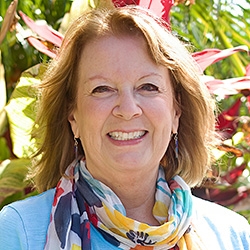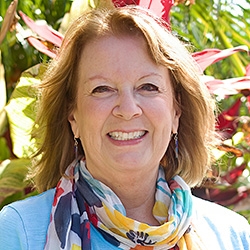

Search Results: nvc
-
Want things to change in your community, but feel frustrated or don’t know what to do? Miki’s intriguing overview of how to apply the principles of NVC to social change movements may have the exact blend of inspiration and ideas you’re seeking!
-
Listen as Miki works with participants. Topics: how small requests serve interdependence; NVC process vs purpose; how to respond when empathy is used to create distance; coping with verbal aggression, and more!
-
Trainer Tip: In Compassionate Communication, we consider needs to be universal. That means that while we all have the same needs, such as for love, support, shelter, food, joy, caring, etc., we choose different ways to meet our needs.
-
Rachelle Lamb invites us to consider how our well being is impacted by what we choose to put at the center of our narrative regarding our needs. And how that affects whether or not we get closer to truly serving life and compassion...
-
Sometimes there are moments when empathy has no effect at all on one another. Why? One reason could be that our brains might be less receptive because of unseen forces that affect our nervous system and relationship with others.
-
When we don't like what someone is saying to us, sometimes people encourage us to hear their needs, and "not take it personally" -- and we're inclined to agree. Could "not taking it personally" close our hearts and awareness to others, life and ourselves? Rachelle Lamb invites us to take a closer look at what it's like when we attend to the situation from our hearts, and skillfully reflect upon our actions with tenderness.
-
How can we live up to our true potential, a life filled with relationships and experiences that truly meet our needs? In this article, Mary offers us a way to bring about inner transformation that can lead to seeing ourselves, others and life differently -- for greater agency, empowerment and choice.
-
What's really going on underneath the surface when we bring or encounter blame, judgements, pain -- and thereby the inability to empathize, be present, attuned, or responsive? Why does this happen even if one or more people in a relationship dynamic is working hard at bringing in an NVC response? This article addresses these and more questions from the perspective of how our brains are affected in our relationships.
-
Sometimes even a very skilled empathy practicitioner can go into offering a non-empathic response, even when asked for empathy. Why? One reason could be that our brains might be less receptive because of unseen forces that affect our brain and relationship with others. This article speaks to the deeper "why" and also to one thing we could do to turn it around...
-
The awareness and practice of interdependence is integral to holding an NVC consciousness. Practicing interdependence also means bringing in a quality of care in the moments we want to change agreements with others. This article talks about where our various choices, in regards to changing agreements, fits into different levels of engaging our interdependence.
-
During this session, Giorgos will walk you through a series of short, meditative practices and exercises designed to help you practice noticing, experiencing, and bringing shame to light — transforming it from a burden to a playful fellow as well as a portal to self-knowledge and internal freedom. You'll discover how the deep power of human connectedness can dilute the fogginess of sensitive issues, bringing them higher into your consciousness, and enabling the flow of life to pass right through them!
-
We can choose our stories of interpretation, and how to respond. And while stories of self-sufficiency can (to a degree) give us more influence over our own lives, they don't erase oppression, war, nor climate change. When stories omit a lens that includes impacts of interdependence, oppression, and structural inequities, stories can also keep us disconnected and blocked from compassion for self and others -- and perpetuating an oppressive status quo. However, with this lens we can make greater compassion and collective liberation possible. Even as the outcome is unknown.
-
The less blame and criticism, the easier it is for others to hear us. From this perspective, it’s in our best interest to come from curiosity and care. This way differences can bring us together and help us know one another. The more mutual understanding, the easier it is to work together and find creative solutions. Read on for more on this, with a story about how a black man inspired 200 members of the KKK to leave the organization.
-
"All humans share the same needs" -- tragically, this idea can hide the reality that some people with less power in society have needs that go unmet to a greater extent, much longer, and with more dire consequences. Often, when the marginalized bring up experiences related to their membership in a certain group, their pain isn't acknowledged, and focus shifts to the listener's discomfort. The concept of universal human needs can be used to silence and minimize their pain. Read on for how to proceed.
-
When an entity or system has authority or power and mandates something we don't agree with we may submit or to rebel. If we submit, we give in or give up, often out of fear. If we rebel, we're in reactivity which may not help our cause, and reduce our power. This may result in others' resentment, anger, and pain. Gandhi and Martin Luther King didn't submit nor rebel. Instead, they were in choice and advocated for their cause.
-
Rediscover your innate capacity for collaboration and learn to overcome systemic barriers.
-
Gain practical skills to navigate organizational differences and foster collaboration.
-
Strengthen team collaboration by building relationships and navigating shared challenges.
-
Create and sustain a collaborative culture by learning which systems shape organizations.
-
Total inclusion is impossible: inclusion of all can often lead to exclusion of those who can't bear the behaviors of some. Many groups flounder and disintegrate because of too much inclusion. Limited resources and capacities may make it necessary to exclude. Keeping more coherent shared values and strategies may be another reason to place membership conditions so that what appears to be exclusion may give movements a chance to expand.
Quick Links

Stay in Touch!
We value your privacy, won't share your email address and you can easily unsubscribe any time.


















